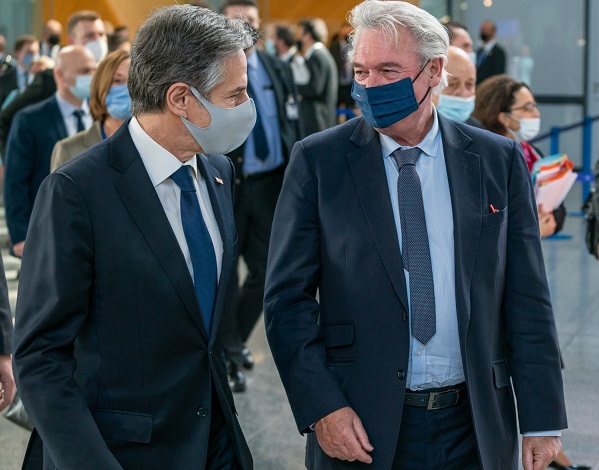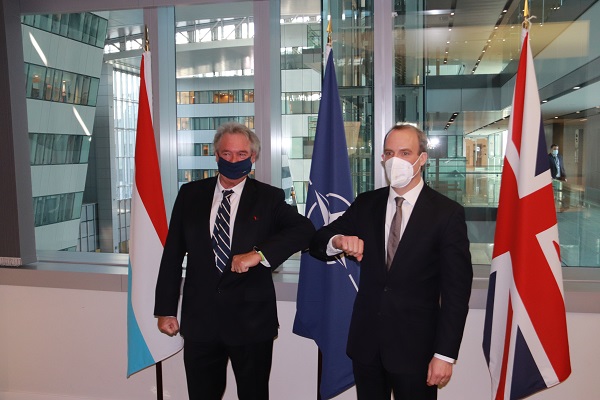 (Above) Antony Blinken, US Secretary of State, and Jean Asselborn, Luxembourg's Minister of Foreign and European Affairs; (below) Jean Asselborn and Dominic Raab, UK Foreign Secretary;
Credit: (Above) NATO; (below) MAEE
(Above) Antony Blinken, US Secretary of State, and Jean Asselborn, Luxembourg's Minister of Foreign and European Affairs; (below) Jean Asselborn and Dominic Raab, UK Foreign Secretary;
Credit: (Above) NATO; (below) MAEE
On Tuesday 23 and Wednesday 24 March 2021, Luxembourg's Minister of Foreign and European Affairs, Jean Asselborn, participated in the meeting of NATO Foreign Ministers in Brussels.
The two-day event, which took place under the chairmanship of NATO Secretary General Jens Stoltenberg, was NATO's first meeting at ministerial level to be held face-to-face since the start of the COVID-19 pandemic. It was also the first NATO ministerial meeting to be attended by the new United States (US) Secretary of State, Antony Blinken.
Day One
During this meeting, the foreign ministers of the 30 allied countries adopted a declaration expressing their common desire to strengthen the transatlantic partnership.
The first working session on Tuesday was devoted to a review of the situation in Afghanistan and the efforts being made to achieve lasting peace there. Minister Jean Asselborn noted that "intra-Afghan negotiations, even if they proceed only slowly, are the first realistic chance for peace in Afghanistan". He welcomed any initiative which will increase the chances of success of the peace negotiations, stressing that "a further internationalisation of the process, under the auspices of the UN [United Nations], by also involving regional interested parties, could serve this objective". He added that "the process, nevertheless, must be led by the Afghans themselves".
Minister Jean Asselborn emphasised that Luxembourg will remain at the side of the Afghan people while also maintaining its support for the Afghan security forces until 2024. He insisted on the need to preserve the achievements of the last decades, noting: “I am thinking in particular of progress carried out by the Afghan people with regard to the rule of law and democracy, the rights of minorities and the rights of women and children".
The foreign ministers also looked at security challenges in the Middle East, North Africa and the Sahel. Luxembourg's Foreign Minister stressed the importance of NATO acting in close consultation with the other organisations present on the ground, in particular the European Union (EU). He recalled that Luxembourg is involved in the UN Multidimensional Integrated Stabilisation Mission in Mali (MINUSMA) and the EU Training Mission in Mali (EUTM Mali), while financially supporting projects implemented by NATO with its partner countries in the North African and Middle Eastern regions, particularly Jordan and Tunisia.
The ministers also had an in-depth discussion on the NATO 2030 initiative. Minister Jean Asselborn welcomed the process underway, which aims to strengthen the political dimension of NATO and adapt it to the challenges of the future. He pointed out that "Luxembourg supports a strong transatlantic Alliance, united and faithful to its values and whose centre of gravity must remain the Euro-Atlantic area".
Luxembourg's Foreign Minister welcomed the NATO climate change and security agenda that was adopted during the meeting.
Day Two
The NATO ministerial meeting continued on Wednesday with an exchange of views on the approach towards Russia, in the presence of the Foreign Ministers of Finland and Sweden as well as Josep Borrell, the High Representative of the EU for foreign affairs and security policy.
While acknowledging the fact that Russia represents a major geopolitical challenge and that it is turning away from the rule of law, Luxembourg's Foreign Minister spoke out in favour of maintaining a dual approach, including both deterrence and dialogue, within the framework of the NATO-Russia Council (NRC). He noted: “Despite the current difficulties, we continue to see opportunities in the dialogue. It allows us to question Russia and correct erroneous perceptions".
Regarding disarmament and non-proliferation, Minister Jean Asselborn welcomed the agreement concluded by the US with Russia to extend the New START nuclear arms reduction treaty until 2026. He commented: "This development represents one of the rare touches of light on a generally dark picture".
On the sidelines of the NATO meeting, Minister Jean Asselborn spoke with Dominic Raab, the United Kingdom's (UK) First Secretary of State and Foreign Secretary, at the request of the UK side. The two ministers discussed the evolution of the COVID-19 pandemic and the importance of ensuring access to vaccines. They also took stock of the cooperation between Luxembourg and the UK in multilateral forums and of the efforts underway to achieve an ambitious result at the COP26 in Glasgow in November.









